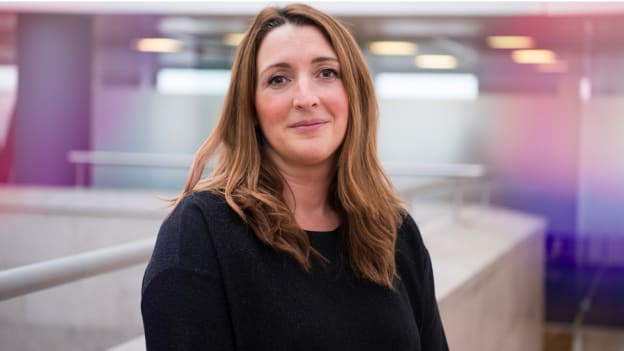Data, tech and allies: Driving authentic inclusion

Nancy Lengthorn is presently the Global Chief Inclusion and Culture Officer at Mediacom, a business unit of marketing and advertising giant WPP.
Nancy brings over twenty years of illustrious industry experience across the media and advertising industry. She joined Mediacom back in Feb 2012 as the Head of the Recruitment and Talent function. Over the years, Nancy led Mediacom’s diversity and inclusion strategy, and went on to become Managing Partner - Head of D&I and Future Talent.
In addition to her current role at Mediacom, Nancy was also appointed as the Head of Inclusion and Belonging at WPP in Jan 2020.
In this exclusive conversation with People Matters, Nancy sheds light on why underrepresented talent stays hidden despite the DEI spotlight, and how allyship, data, storytelling and role modeling are crucial to building a safe space at the workplace.
Read on for highlights from the conversation.
How is Mediacom approaching DEI in the evolving business and work climate? What are your focus areas?
We're trying to approach this in a way that we think is more honest and bold. Our philosophy is that we probably are where we are in society because we have always made conversations about DEI comfortable for majority groups.
Society generally has focused on sort of palatable conversations around how we can get to a better place, but we don't believe that approach is effective, because we're ignoring what's really happening.
We're ignoring root causes and are just trying to sort of treat the symptoms when we do things like that.
Our practice is a bit more fundamental, and certainly more challenging, but we think it will have better results. We have just trained 250 Mediacom leaders on the concept of ‘oppression’ through a four-day training course. It was really quite intense, quite heavy, with difficult concepts, difficult things to hear, and difficult things to learn. But we think if we don't teach people what oppression is, how it manifests, where it manifests, what narratives it is wrapped up in, how are we really going to do anything that is fundamentally different?
Quite often in companies, people are being asked to do things differently, and they're being asked to be more inclusive. But that’s not how we do things in any other fields. We don't tell somebody to be better with digital marketing without training them how to do that and really teaching them what that means, we just don't do that; we would equip people with tools to do it. So we're very much trying to go down this education route and if we equip people with that understanding, they will then be in a place where they can understand how they might have been part of the problem in the past, and think how they can be part of the solution going forward.
Secondly, inclusion can’t be one person's job; it's got to be something that everybody is chipping away at.
And that's really the approach that we're trying to take. We have just launched ‘Safe Space’ allies, a group of people trained to hear other people's experiences. So if somebody is experiencing microaggressions, somebody has heard something inappropriate, seen something inappropriate, we want everybody to be empowered to be able to raise that and be supported. It is really about systemic change, really understanding root causes, and redesigning things and doing things differently. It's a much more fundamental grassroots approach - let's understand really what the problem is and let's tackle things in a different way so we have results.
For us the focus is inequity, rather than a specific community. If you eliminate inequity and oppression, then all communities benefit. So we're trying to do it in a more intersectional way. I think it's problematic when you have companies who say, “Well, this year we're going to focus on gender or ethnicity.” Well, you're not going to solve it in a year, so when do you move on to the next topic then? I understand why people do it, because it's methodical. People are trying to look for something, because in the space of inclusion you do feel like where do you even start. There's so many things that are not okay.
I do understand why people think let's have a methodological approach, but that’s not how human beings work.
We are complicated beings and all the parts of our identities need to be addressed at the same time, not in a schedule of the next 10 years. It doesn’t work like that.
A recent Harvard Business School report coined the term 'hidden workers' to reflect the missing talent pool in global hiring efforts. In your opinion, what is keeping underrepresented talent hidden despite the spotlight on DEI today?
There is a focus on DEI, but how much of it is authentic? If companies aren't changing their processes, they aren't changing what their recruitment, retention and promotion processes are like, then all of those systemic points of business stay the same. And people in marginalized groups - the hidden talent - they can see that.
If the business has fundamentally changed what they're doing to enable somebody like me to be included in that recruitment process, then there’s a chance that people will trust that it’s a safe place to be. When efforts are tokenistic and all about let's buy this colour balloon because it's this day and we won't talk about that topic for the rest of the year, the hidden talent can see that and know that's not a safe place to be because you haven't done anything to actually make sure that my experience is positive, and safe.
What we are doing, for example, with our entry level recruitment process, we make sure that everybody knows exactly what will happen on the selection day that they come to us for, we spell out the schedule in real detail, because anyone who is neuro diverse needs that level of clarity about what that process looks like so that there are no surprises. They can understand and plan what their routine is going to look like. When you do little things like that, that's when people think, “Ok, this may work out for me”, and that hidden talent then has confidence that things can be ok. But people need to see those signs. Until they see those signs, why would they believe that business is safe?
The problem is everyone just focuses on diversity, not inclusion. If that’s what you are doing, you're really just treating people like pawns and thinking of them as numbers. Even if you hire diverse employees, that talent will churn so quickly and they will also leave your company with a negative experience which they will end up talking to other people about.
You've got to do the work before people feel like they trust you enough to come in.
How can companies change their hiring infrastructure such that it encourages applicants of all backgrounds to apply?
We find the traditional CV approach quite problematic because:
- The things on there are an indication of whether someone's come from a comfortable background or not, and then that starts to persuade us that if they're going to be okay.
- Quite often, things on that piece of paper are things that another adult at the other end has told them to put on that piece of paper, the right things to make them look like a team player, among others. It isn't really telling us about that person's personality, potential or behaviors.
About 12 years ago we radically changed that and introduced an application process that enabled them to talk about themselves. For entry level candidates, we took away the need for any education criteria. Instead of asking what degree did you get, we started asking questions like - 'Tell us about a time when you had to step up and take responsibility for something. Talk to us about something you're passionate about. Tell us about when you've been brave.' These things actually are more about people's behaviors and their values, their potential. We then ask them to come to a selection day that has multiple different types of activities and tasks. And so we can start to see people in very different tasks, and then we identify their strong areas. It’s about identifying their challenges to help them on that day, it's not about eliminating them from that process.
We also make sure that there is a very diverse group of people who assess those candidates. A group of people to see different things. We also have a really strict process. We use software that enables us to grade people. It's not about “I've just got that feeling I really like that person”, it's getting graded against a task based on a criteria, so that it's more fair and transparent.
Another important element in DEI is that we also talk about our DEI philosophy at the start that day. We talk about our culture, vision, what we're trying to achieve, where are we trying to get to. We talk to them about things like our mental health allies program, so that people really understand that this is a place where you can be honest about mental health. This is a place where you will be supported if you face different challenges.
The thing is we are hard-wired, we don't even know or realize that we are acting on our biases.
We're hardwired to find somebody who's like us because you think “I know how to do that job, so therefore if you display those similar qualities to me then immediately I am going to feel warmer towards you.” If you break all of that, if you take all of that away, you start to look for different things. You start to recognise other things in people that a traditional interview process isn’t geared up to bring out really.
What role is technology playing on the DEI front? How is Mediacom leveraging the digital era to fast track the DEI agenda?
One very important way that we've been using a survey platform called Perspectives for the last couple of years that has enabled us to anonymously survey people on lots of different questions around career, inclusion, belonging, development, retention, all really important things that keep us in the workplace. And that data, having access to that platform has enabled us to really club that data by different groups and to look at things in an intersectional way. So we know precisely how different communities feel about different factors.
Tech is crucial to being able to get that data because it needs to be anonymous and safe and needs to be GDPR compliant. We need to be really careful with that data, because it's such sensitive information that then enables me to be really specific and focused about what we're tackling, and how it's happening.
For instance, scores of black men were low in certain areas and that has enabled us to put in a program for them which is like a community space. They can come together and participate in conversations around their development, in addition to engaging in emotional conversations and building a sense of community. It would be hard for me to justify that, just on hunch. I need to be able to say this is what this community is telling us, and therefore we need to do something about it.
That really has changed everything. Tech and data is everything. I think it's very hard to do this job without knowing that picture.
How crucial are support groups and allyship when looked at from an employee well-being perspective? What are some ways to weave such support in the flow of work, rather than occasional conversations?
Allyship is a massive focus area for us. It is a huge part of building trust. It's about understanding what oppression is and where it manifests, and then it's on all of us.
Mediacom has done lots of different things in this area. Firstly,on the well-being front, since 2017 we've had a Mental Health Alliance programme in place. We have people who are trained in mental health, but also in mental health conversations on - how do you have that positive conversation with somebody? How do you support somebody without taking over, without passing judgment accidentally? How do you have a conversation with somebody who's struggling, that’s positive and supportive?
That program is about the allies, just being there for somebody, and helping them access professional help, helping them to feel heard and supported, and saying, “I'm going to listen. You need to talk about it, and I am going to give you that safe space to be heard.” So that concept of allyship is something that's very embedded at Mediacom. Now we even have “Safe Space Allies”. People have been trained to talk about microaggressions and instances around inappropriate behavior.
About two years ago now, we talked to our employees confidentially, about microaggressions and experiences that they have experienced in the workplace and in society in general. We turned those stories into short films about microaggressions, which was shown to the whole company, multiple times. We've also shared with them the data that I talked about earlier. “Here's the data, this is what different communities are telling us, but also from this film you can hear what the lived experience is to match those numbers.” So there's the quantitative and the qualitative approach.
We put in place our training and also conducted mandatory workshops. Making them mandatory is controversial in the inclusion space, but for us it’s about setting a minimum standard of behavior.
You have to make that mandatory because this is about making sure that people come to work and are safe.
We made everybody undergo allyship training, to help them get practical about it - here's how you show up for people, here’s how you cool things out, here’s how you cool things in, these are the techniques and the sentences that we will need to practice so that we can step in when something inappropriate is happening. Because by nature, most of us tend to just sort of sit there and panic, and let it happen and then think that was awful but not actually do anything about it. So, that’s a key pillar of our strategy.
We're increasingly equipping people to know how to step in and tackle something. And we are continually making the point that this is everybody's job.















